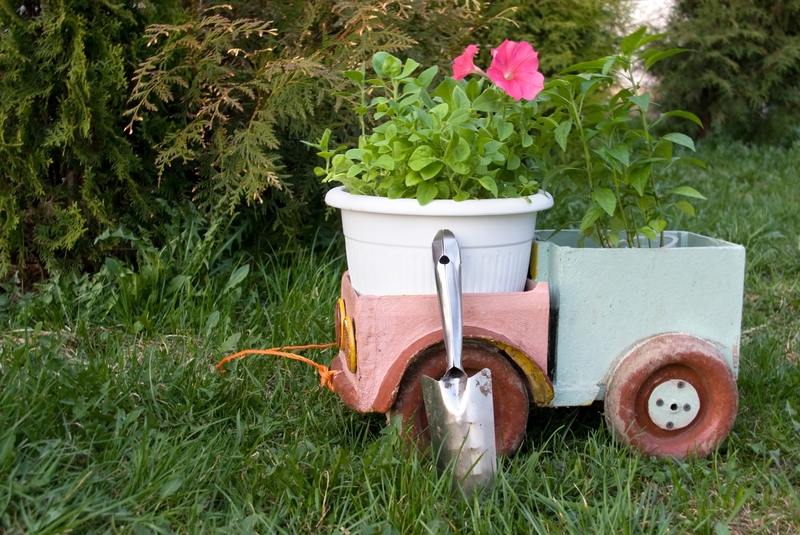Redefining Ease in Plant Pot Disposal: An Eco-Friendly Guide
Disposing of plant pots may seem like a simple task, but as any avid gardener or houseplant enthusiast knows, it often leads to storage clutter and confusion over sustainability. In an era prioritizing environmental responsibility, redefining ease in plant pot disposal becomes not just a practical concern but a moral one. This comprehensive guide unpacks modern methods, sustainable alternatives, and creative approaches to making plant pot disposal easy, eco-friendly, and efficient.

Understanding the Plant Pot Disposal Problem
Whether you nurture a collection of succulents on your windowsill or manage a lush garden, plant pots inevitably accumulate over time. Plastic, terracotta, ceramic--and now increasingly, biodegradable materials--each present unique disposal challenges:
- Plastic plant pots: Lightweight and affordable, but take centuries to break down in landfills.
- Terracotta and clay pots: Natural but heavy and prone to breaking, complicating recycling.
- Ceramic pots: Durable, yet non-recyclable and often glazed with toxic compounds.
- Biodegradable pots: Eco-friendly but still uncommon and sometimes costly.
Given these obstacles, rethinking plant pot disposal focuses not only on ridding ourselves of clutter but also on **minimizing environmental impact, maximizing convenience, and exploring creative reuse.**
Why We Must Innovate Plant Pot Disposal
Traditional avenues--tossing them in the regular trash--often result in environmental stress. Plastics account for significant landfill volume and may leach harmful chemicals. Broken ceramics linger untouched for centuries. Piled-up pots create eyesores and safety hazards for gardeners and families alike.
By redefining plant pot disposal, we not only clear space but also align with the global movement towards a circular economy. Reducing waste, promoting reuse, and recycling are key pillars of this transformative approach.
Modern Solutions for Plant Pot Disposal
1. Responsible Recycling
Not all plant pots are created--and recycled--equally. Many municipal recycling programs exclude certain plastics and ceramics. Here's how to make recycling easy and effective:
- Know Your Plastics: Look for recycling symbols on the bottom of your plastic pots. Many are polypropylene (PP, #5), which may be accepted at specialty recycling centers but rarely curbside.
- Community Drop-Off Programs: Many garden centers, such as Lowe's or The Home Depot, offer plant pot recycling events. Confirm accepted materials in advance.
- Clean and Sort: Remove soil, debris, and labels. Clean pots are more likely to be accepted for recycling.
- Terracotta and Ceramic Disposal: While not recyclable in most municipal programs, these can be broken up and used as drainage material in new pots--or donated to schools and artists.
2. Creative Reuse and Upcycling
While disposal often implies "throwing away," a more sustainable approach focuses on giving your plant pots a second life. Consider these creative ideas for plant pot repurposing:
- Garden Organization: Use small plastic pots to store garden tools, organize seeds, or as watering scoops.
- Home Decor: Paint or decorate terracotta and ceramic pots for use as stylish storage or desk organizers.
- Arts and Crafts: Donate unwanted pots to local schools, art groups, or community gardens.
- Seedling Starters: Old pots make excellent starter homes for new seedlings, sparing you from buying additional small containers.
3. Biodegradable and Compostable Alternatives
As consumer awareness grows, so does the variety of eco-friendly plant pots available. Compostable pots made from coconut coir, peat, rice hulls, or recycled paper can be planted directly in-ground and will break down over time. By choosing these options from the start, disposal becomes seamless and green:
- Start with Sustainable: Buy biodegradable pots for new plantings. You'll never need to worry about disposal.
- Compost What You Can: Some compostable pots can be added directly to your compost bin once their lifespan ends.
- Encourage Local Nurseries: Request eco-friendly options where you buy your plants. Demand encourages supply!
4. Donation and Community Sharing
Before tossing your pots, think community first. Many organizations, community gardens, and urban farms are grateful for donated plant pots to support planting projects:
- Community Gardens: Many operate on tight budgets and welcome free supplies.
- Schools and Non-Profits: School garden projects, youth organizations, and non-profits appreciate material donations.
- Online Sharing: List your excess pots on neighborhood forums like Nextdoor, Facebook Marketplace, or Freecycle.
Revolutionary Innovations in Plant Pot Disposal
The market is transforming, with exciting innovations in easy plant pot disposal emerging worldwide:
- Return Programs: Some nurseries and garden retailers now offer "take-back" services for used pots.
- Recycling Partnerships: Industry alliances like The Nursery Plastics Recycling Program are working to streamline acceptance and processing.
- Smart Materials: Companies are developing new plant pot materials that decompose harmlessly or that can be remolded infinitely.
- Bulk Collection Initiatives: Municipal programs in some cities now collect plant pots at specific times annually to ensure proper processing.
Step-by-Step Guide for Effortless Plant Pot Disposal
To help you put these principles into action, here's a straightforward process to redefine ease in disposing of plant pots and keep your garden (and conscience) clutter-free:
- Sort Pots by Material: Separate plastic, ceramic, terracotta, and biodegradable pots. This will streamline the next steps.
- Clean Each Pot: Remove any soil or plant residue. Clean pots are more attractive for donation and more likely to be accepted for recycling.
- Check Local Recycling: Call your local center or search online to determine what pot materials they'll accept. Plant pot recycling policies vary widely.
- Donate or Share Excess: Reach out to community gardens, schools, or list your pots on sharing sites.
- Upcycle Creatively: If you're crafty, transform old pots into planters, bird baths, organizers, or art projects.
- Compost if Possible: If you have biodegradable pots, add them to the compost or plant directly into the ground.
- Participate in Take-Back Events: Visit your local nursery during bulk recycling days to drop off large amounts at once.
Best Practices for Sustainable Plant Pot Management
Buy Smart, Dispose Smarter
The surest way to make disposal easy is to start with sustainable choices. Opt for minimal packaging, purchase only what you need, and prefer pots made out of recycled or biodegradable materials when possible.
Embrace a Circular Plant Pot Economy
A true transformation in plant pot disposal ease comes from embracing circularity:
- Resist Single-Use Pots: Choose pots designed for multiple uses or easy composting.
- Support Retailers with Take-Back Programs: Your purchase can drive change industry-wide.
- Educate Others: The more we share information, the more sustainable options become accessible and normalized.

Frequently Asked Questions about Plant Pot Disposal
Can all plant pots be recycled?
Sadly, not all pots qualify for recycling. Plastic pots with recycling codes #2 or #5 are sometimes eligible, but check with your local provider. Terracotta and ceramics typically aren't recyclable through municipal services but may have reuse opportunities.
What should I do with broken plant pots?
Don't rush to toss broken pots! Terracotta shards can improve soil drainage. Ceramic fragments make creative mosaic art. Even cracked plastic pots can serve as plant saucers or weed barriers.
Are biodegradable pots truly better for the environment?
Absolutely! Biodegradable pots made from plant fibers, coir, or other organics break down in soil or compost piles, leaving no trace behind. They're perfect for plantings that will mature in the ground.
What's the best way to encourage others to reuse or recycle plant pots?
Lead by example--share your plant pot recycling or upcycling successes on social media, talk with fellow gardeners, or organize a local swap event. Awareness inspires action!
Conclusion: A Greener Path to Plant Pot Disposal
As gardeners, homeowners, and plant lovers, we hold the power to drive environmental progress through daily choices. By redefining ease in plant pot disposal--whether via recycling, reusing, donating, or choosing biodegradable varieties--we move closer to a sustainable, clutter-free future.
Let's continue to spread the knowledge, demand better products, and cultivate solutions that benefit both our gardens and our planet. Start today by sorting your old pots, seeking out local recycling schemes, and inspiring others to join the movement.
With these innovative strategies and shared commitment, plant pot disposal truly becomes easy, eco-friendly, and rewarding--for you and for generations to come.